SWEDISH
SOUTH ASIAN STUDIES NETWORK
Newsletter 54:
15 August 2005
| Research News | |
| New and updated information to the web site | |
• 2005 World Water Week at Stockholm
of great interest for South Asia
 The
2005 World Water Week is held in Stockholm, Sweden 21–27 August.
It includes the 15th Stockholm Water Symposium with the the overall
theme “Drainage Basin Management. Hard and Soft Solutions in
Regional Development.” The Stockholm World Water Week has become
a valuable meeting point and platform for the world’s water community,
and includes topical plenary sessions and panel debates, scientific Stockholm
Water Symposium workshops, seminars and side events organised by different
international organisations. A large number of delegates come from South
Asia. More information on the
World Water Week.
The
2005 World Water Week is held in Stockholm, Sweden 21–27 August.
It includes the 15th Stockholm Water Symposium with the the overall
theme “Drainage Basin Management. Hard and Soft Solutions in
Regional Development.” The Stockholm World Water Week has become
a valuable meeting point and platform for the world’s water community,
and includes topical plenary sessions and panel debates, scientific Stockholm
Water Symposium workshops, seminars and side events organised by different
international organisations. A large number of delegates come from South
Asia. More information on the
World Water Week.
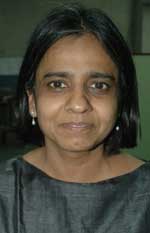 The 2005 Stockholm Water Prize
will also be awarded. The 2005 award will be given to the New Delhi based
Centre for Science and Environment
(CSE), for its efforts to build a new paradigm of water management, using
traditional wisdom of rainwater harvesting and advocating the role of
communities in managing their local water systems. The Director of CSE,
Ms. Sunita Narain (photo to the left) will be present to receive
the $150,000 Prize from HM King Carl XVI Gustaf of Sweden on Thursday
25 August. More
information on the award.
The 2005 Stockholm Water Prize
will also be awarded. The 2005 award will be given to the New Delhi based
Centre for Science and Environment
(CSE), for its efforts to build a new paradigm of water management, using
traditional wisdom of rainwater harvesting and advocating the role of
communities in managing their local water systems. The Director of CSE,
Ms. Sunita Narain (photo to the left) will be present to receive
the $150,000 Prize from HM King Carl XVI Gustaf of Sweden on Thursday
25 August. More
information on the award.
Several of the panel sessions cover issues
of specific relevance to South Asia, including those on
”Hydraulic Infrastructure as a Platform for Economic Growth”,
and ”Can we Meet International Water Targets Without Fighting
Corruption?”. The session involving most South Asian researchers
is however the one called ”The Political Economy of Defecation:
Tales of Water and Excreta, and The Imperative of Rainwater. Harvesting,
Reuse and Recycling in Cities of the South”. The panel is chaired
by Dr. A Vaidyanathan from Madras Institute of Development Studies, Chennai,
India, and includes papers presented by Sunita Narain, S.V. Suresh Babu
and R.K. Srinivasan from the Centre for Science and Environment in New
Delhi, as well as K.V. Raju from the Institute For Social And Economic
Change in Bangalore. The session will be held on Sunday 21 August, 13.00–17.00.
As a side event a new book on ”Climate
Change and Water Resources in South Asia”, published
by Taylor & Francis, will be launched at a ceremony on Wednesday 24
August, at lunchtime. The book has been edited by Dr. Monirul Mirza, Adaptation
and Impacts Research Group (AIRG), Environment Canada, and Dr. Q.K. Ahmad,
Chairman, Bangladesh Unnayan Parishad. More
information on the book.
• Haellquist memorial collection now
being catalogued
A Karl Reinhold Haellquist memorial collection is presently
being established at the Lund University’s Asian Library, located
within the premises of the Centre for East and South East Asian Studies
and SASNET, in the Alfa 1 building at Ideon Research Village in Lund.
The renowned Swedish scholar Karl Reinhold Haellquist who passed away
in 2000 was a historian specialised on South Asia and for more many years
working at the Nordic Institute of Asian Studies (NIAS) in Copenhagen.
His wife Inger Sondén Haellquist has donated 5 000 volumes from
her late husband’s private library. It is currently being catalogued
and a minor part of it is already accessible. More
information.
• Professorship position in Sanskrit
at Oslo University
A Professorship position in Sanskrit has been announced by the
Department of Culture Studies
and Oriental Languages, University of Oslo. The person
appointed must have a completed doctoral degree in Sanskrit Studies or
equivalent, and relevant academic publications (relevant disciplinary
areas include Sanskrit philology, historical Indo-Aryan and/or Dravidian
linguistics, history of religions and Sanskrit literature). Furthermore
applicants must within two years acquire a sufficient mastery of the Norwegian
language to be able to perform all the duties appropriate to the post
of professor at the University of Oslo. Deadline for applications: 1 November
2005.
• Time to apply for positions at University
of Toronto
The Department of Historical Studies at the University of Toronto
at Mississauga invites applications for three positions: A tenure-stream
Assistant Professor position in the History of Islam; an Assistant/Associate
Professor position in Buddhism; and an Assistant/Associate Professor
position in South Asian Religions. The selected candidates will be expected
to contribute to a new undergraduate program in the History of Religions
on the Mississauga Campus and to growing research-intensive doctoral
programs in the Graduate Department and Centre for the Study of Religion
and/or the Department of History on the St. George Campus of the University
of Toronto. Deadline for applications to all three positions is 15 September
2005. The appointment will begin 1 July 2006; an appropriate doctoral
degree must have been earned by that date.
• NCI offers
full semester program for Nordic students in Hyderabad
The Nordic Centre in India organises
a full semester program for Nordic students at the University of Hyderabad
from the Fall 2005. The Nordic Centre
has made an arrangement with the University of Hyderabad to allow 15 Nordic
students to be admitted there, and to take courses on various social science
and humanities subjects. In most cases these should count towards degrees
accepted at home. The first batch of students will be admitted for the
autumn of 2005, the next for the spring semester of 2006. More
information.
• Kolkata winter course on Forced Migration,
Racism, Immigration and Xenophobia
A 15-day residential course on ”Forced Migration, Racism,
Immigration and Xenophobia” is held in Kolkata, India, in the winter
2005-06. The short-term winter course, to be organised by the Mahanirban
Calcutta Research Group (CRG), is intended for younger academics, refugee
activists and others working in the field of human rights and humanitarian
assistance for victims of forced displacement. The course will be preceded
by a two and a half month long programme of distance education. Experiences
of providing relief, rehabilitaion, and resettlement for the
victims of the Tsunami in the Andaman Islands and Tamil Nadu will be included
in the course. More information.
• South Asia on the schedule for CEAS
courses in Göteborg
The Centre for Asian Studies (CEAS) at Göteborg University
runs a programme on basic and intermediate level (1–20 credits
and 21–40 credits) in Asian studies, which includes teaching on
South Asia. In the Fall 2005 a new beginner’s 20 credits course
will run. A C-level 20 credits course in Asian Studies (Fördjupningskurs)
is also run in the Fall 2005.
CEAS also organised a 10 credits course on ”Women in Asia; Religion,
Politics and Development” during the Spring 2005. Students at
Chalmers University of Technology in Göteborg
have a chance to participate in a 5 credits course called ”Women
and development in Asia”. A course that is part of the 10 credits
CEAS course on Women in Asia.
In the Spring 2006 the Centre for Asian Studies plans for a new course
called ”South Asia today”..
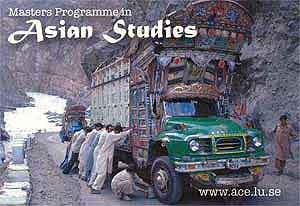 •
Masters programme in Asian studies for the third time in Lund
•
Masters programme in Asian studies for the third time in Lund
A 60 credits (three semesters) Masters Programme (”Magisterutbildning
med bredd”) in Asian Studies has been successfully run at
Lund University since the Fall 2003. The programme is divided into two
tracks, one for East and South East Asian studies, and one for South Asian
studies, and is administered by the Centre for East and South-East Asian
Studies (ACE) at Lund University. The first group completed their programme
in December 2004, whereas the second group is carrying out field work
in South Asia during the Fall 2005. A third group of Masters students
commence with their programme in September 2005.
• Lund University course on Natural
Hazards and Natural Disasters
The Division of Water Resources Engineering
at the School of Civil Engineering, Lund University, plans for a 5 credits
doctoral course on Natural Hazards and Natural Disasters during September
and October 2005. The course will be led by Dr. Monirul Mirza, originally
from Bangladesh but currently working within the Adaptation
Impact and Research Group at the Instute for Environmental Studies,
University of Toronto, Canada. It deals with risks to society from natural
hazards and disasters, and how society adapts to those risks. More
information on the course (as a pdf-file).
• Courses on Indian religions at Lund
University
Since 2001 the Indic Religions Division,
Centre for Theology and Religious Studies, Lund University, has offered
several South Asia related courses, including 20 credits half-time courses
in Elementary Sanskrit, and a number of specialised 5 credits courses
on Bhagavadgita; Western Buddhism; Yoga and Meditation in Indian religions;
Tantra and Tantrism; Jainism, Non-violence and Vegetarianism; and Astrology
and Divination in Indian religions. During the Fall 2005 the Indic Religions
Division arranges a 5 credits course on Tantra and Tantrism, and a new
5 credits course on Indic Philosophies.
In the Spring 2006 a 5 credits course on the Bhagavadgita will be held
and a 5 credits course on Western Buddhism.
A 5 credits course on Sikhism will most probaly be introduced from the
Fall 2006. It will the first course on Sikhism at any Scandinavian university,
and the teaching will be carried out by Kristina Myrvold, researcher specialised
on Sikh studies.
During the Fall 2005 the section for Islamology
at the Centre for Theology and Religious Studies, Lund University, will
again arrange a 5-credit course on Local Islam: Islam in South and South
East Asia.
• International course on Conservation
and Management of Historic Buildings at Lund University
The Dept of Housing Development and Management,
Division of Construction & Architecture, Lund Institute of Technology;
Lund University, regularly arranges Sida-sponsored short courses directed
to planners, architects, civil engineers, administrators and others working
with construction, housing and human settlements. A postgraduate training
course on Conservation and Management of Historic Buildings will again
start start in September 2005 in collaboration with the Department of
Architectural Conservation and Restoration, Lund University. The first
three-weeks part is held in Lund, and the course then continues with a
two-weeks tour to Africa or Asia in the spring 2006. More
information.
• Uppsala University courses on Postcolonial
Natures and Political Ecology
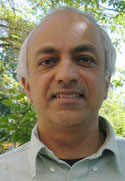 The
Dept. of Cultural Anthropology and Ethnology, Uppsala University,
offers two 5 credits Masters level courses in the field of Environmental
history and political ecology in the Fall 2005. Courses drawing much
from south Asian experiences. The first course is titled ”Postcolonial
Natures”, and will run during September-October. Teacher:
K. Sivaramakrishnan, Professor of Anthropology and International
Studies, University of Washington, Seattle, USA (photo to the
right). Preliminary arrangements
have been made to also include Arun Bandopadhyay, Nurul Hasan professor
of history, Calcutta University, and Dr. Suparna Gooptu, reader,
Department of History, Calcutta University, as teachers in the
course. The second course is titled ”Political Ecology”,
and will run from November 2005 to January 2006.
The
Dept. of Cultural Anthropology and Ethnology, Uppsala University,
offers two 5 credits Masters level courses in the field of Environmental
history and political ecology in the Fall 2005. Courses drawing much
from south Asian experiences. The first course is titled ”Postcolonial
Natures”, and will run during September-October. Teacher:
K. Sivaramakrishnan, Professor of Anthropology and International
Studies, University of Washington, Seattle, USA (photo to the
right). Preliminary arrangements
have been made to also include Arun Bandopadhyay, Nurul Hasan professor
of history, Calcutta University, and Dr. Suparna Gooptu, reader,
Department of History, Calcutta University, as teachers in the
course. The second course is titled ”Political Ecology”,
and will run from November 2005 to January 2006.
• Uppsala Masters programme on War and
Peace in the Name of God
The section for History of Religions
at the the Dept of Theology in Uppsala organises a four semesters part-time
(40 credits) Masters programme on Religion in Conflict and Reconciliation,
called ”War and Peace in the Name of God” in collaboration
with the the Uppsala based Life & Peace Institute.
A new programme starts in September 2005, and involves studies and fieldwork
in Europe, Africa and Asia (Hyderabad, India).
• Folk high school students from Tomelilla
go to India as usual
A one-year undergraduate social science course on India/South Asia, giving
10 academic points, has been arranged by Österlens folk high school
im Tomelilla since 2001 The course is run in co-operation with the Department
of Sociology at Lund University. A new course starts in August 2005, with
field work in south India during January–April 2006. After an initial
common course at Kerala the students visit different places in India
and Bangladesh where they make individual field work. The students give
regular reports through Internet travel diaries. More
information.
• Bangalore conference on Enculturing
Law
A conference on ”Enculturing Law: New Agendas for Legal
Pedagogy” was held in Bangalore, India, 11–13 August 2005.
The conference was organised by the Centre for the Study of Culture and
Society in collaboration with the Alternative Law Forum and the National
Law School of India University, Bangalore. It aimed at addressing some
of the critical problems facing contemporary legal education, especially
legal education in large parts of the global South. CSCS set up a program
for Law, Society and Culture in 2003 with the specific purpose of enhancing
law teaching, research and scholarship in India. Venue: National Law School
of India University Campus, Bangalore.
• South Asia related papers at Finnish
conference on religion
The Finnish Society for the Study of Religion and the Donner
Institute are jointly organising a conference entitled “Exercising
Power: The Role of Religions in Concord and Conflict”, 17–19
August 2005. The conference is sponsored by the European Association for
the Study of Religions, EASR. Some South Asia related papers are presented.
Prof. Gudmar Aneer, Dept. of Religion, Dalarna
University, Falun, on ”Is There Such a Thing as a Religious
Policy? The Role of Religion in the Policy of Akbar the Great Mogul”;
Dr. Dagmar Hellmann-Rajanayagam, Ludwig-Maximilians-Universität,
München, Germany, on ”Heroes and Martyrs: An Ambivalent
concept in ambivalent conflicts”, and Dr. Måns Broo,
Åbo Akademi, on ”Rhetorics of Violence in the Texts of
Bhaktivedanta Swami”. Venue: Linnasmäki Conference Center,
Turku (Åbo).
• Stockholm conference on pluralism
in Balochistan
The 3rd international conference on Balochistan with the theme
”Pluralism in Balochistan” will be held in Uppsala 18–21
August 2005. Balochistan has throughout history been one of the important
meeting points between the Indian Subcontinent and the Iranian Plateau.
Today's Balochistan is divided between Iran, Afghanistan and Pakistan,
and the conference highlights various aspects of plurality in present
day Balochistan. Researchers present papers with a focus on socioeconomic,
religious, linguistic, literary and cultural plurality in Balochistan.
The conference is jointly organised by Prof. Carina Jahani, Iranian
Studies division at the Department of Linguistics and Philology, Uppsala
University; and Dr. Agnes Korn, Vergleichende Sprachwissenschaft, Universität
Frankfurt, Germany. Venue: Ihresalen, Thunbergsvägen 3 G, Engelska
parken, Humanistiskt centrum, Uppsala. More
information.
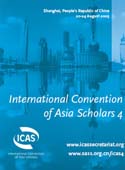 •
1500 Asian studies scholars draw to the ICAS4 conference in Shanghai
•
1500 Asian studies scholars draw to the ICAS4 conference in Shanghai
The Fourth International Convention of Asia Scholars (ICAS)
will be held 20–24 August 2005 in Shanghai, China.
ICAS 4 is hosted by the Shanghai Academy for Social Sciences (SASS) and
is expected to draw more than 1 500 specialists in the field of Asian
Studies, hereby being one of the largest regular gatherings of scholars
whose research centers on Asia and/or Asians, especially in the humanities
and social sciences.
• Buddhist studies conference in London
The 14th Conference of the International Association of Buddhist
Studies will held in London, 29 August – 3 September 2005. The Conference,
hosted by the School of Oriental and African Studies (SOAS, University
of London) and the British Museum, includes panels on issues like ”Studies
of Gandharan Buddhist Manuscripts”, ”The Art History of Early
Indian Buddhism”, ”Buddhist Sanskrit Manuscripts from Central
Asia”, and ”Newar Buddhism”.
• Kathmandu conference on Ethnicity
in Nepal
A conference on ”Negotiating Ethnicity in Nepal’s
past and present” is held in Kathmandu, Nepal, 12–14 September
2005. The conference, organised by Social
Science Baha in collaboration with the Center
for Nepal and Asian Studies (CNAS) of Tribhuvan University, Kathmandu,
and the Institute
of World Society Studies, University of Bielefeld, Germany, deals
with ethnicity formation in Nepal since 1990. Immediately after the “spring
awakening”, the image of a multicultural, multi-religious and multi-lingual
Nepalese society emerged as a powerful counter-project to the official
rhetoric describing Nepal in an assimilative and homogenising language
during the Panchayat period. However, the project to depict the Nepalese
society as ‘multicultural’ has proven to be an embattled ground
where diverse visions, strategies and grievances have come to intersect
and to contest each other. The aim of the conference is to understand
these negotiations and specifically to grasp the dynamics of 'ethnicisation'
and 'de-ethnicisation' in Nepal’s past and present. More
information.
• Mumbai host for Ninth Annual Global
Forum for Health Research
The ninth Annual Global Forum for Health Research will be held
in Mumbai, India. 12–16 September 2005. The theme for the forum,
that usually gathers around 700 participants from a broad range of constituencies,
will be ”Poverty, equity and health research”. The
Global Forum for Health Research was established as an independent international
foundation in Switzerland in 1998. The annual Forum meeting is one of
its most prominent activities to focus attention on the neglected health
research needs of developing countries. It is widely recognized as ”the”
annual gathering on health research.
• Central Asia conference in Krakow
The Ninth Conference of the European Society for Central Asian
Studies (ESCAS) is held at the Jagiellonian University in Krakow, Poland,
12–14 September 2005. The theme for the conference, co-organized
by the Institute of Oriental Philology of the Jagiellonian University
and the Foundation “Institute for Strategic Studies”, will
be ”Central Asia: The Local, the Regional and the Global”.
Panels and paper topics relating to all aspects of humanities and
social sciences on Central Asia are welcome in particular such as:
* history
& archaeology; * sociology & anthropology; * language & literature;
* religion & philosophy; * folklore studies & ethnography; *
civil society & human rights; * political sciences & economics;
* environment
& development; * regional, cross-regional & trans-national studies.
The geographic domain of Central Asia according to the definition of
the ESCAS includes the northern parts of Afghanistan. More
information.
• Oxford Conference on Education and
Development
The United Kingdom Forum for International Education and Training
(UKFIET) invites for its 8th International Conference on Education and
Development in Oxford 13–15 September 2005. The theme for this
year’s
conference is 'Learning and Livelihood', as suggested by the
UN Decade of Education for Sustainable Development (2005-2014). It will
include a symposium on ”Education and the Quality of Life:
Perspectives from South Asia”, convened by Baela Raza Jamil,
Pakistan, and Jyotsna Jha, India.
• Two-week workshop on Tamil Epigraphy
at Sorbonne
A two-week workshop on Tamil Epigraphy is arranged by the French
École Pratique des Hautes Etudes at Sorbonne, 3–14 October
2005. The workshop is intended for students and researchers with little
or no previous experience with the discipline, and aims at studying a
selection of Tamil epigraphic texts from the Chola, Pallava, Pandya and
Vijayanagara dynasties (7th to 16th centuries). Venue: Salle d’histoire,
Ecole Pratique des Hautes Etudes, Section des Sciences historiques et
philologiques, 17 rue de la Sorbonne, Paris. Deadline for registration
is 15 September 2005. More information
(as a pdf-file)
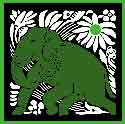 •
The University of Wisconsin-Madison’s 34th Annual Conference on
South Asia
•
The University of Wisconsin-Madison’s 34th Annual Conference on
South Asia
will be held 6–9 October 2005. The Conference is sponsored
by the university’s Center for South Asia, and usually attracts
over 500 scholars and other interested parties every year. The 2005 conference
features over 70 academic panels and roundtables as well as association
meetings and special events ranging from performances to film screenings.
More information.
• New Delhi conference on Politics of
Culture in Contemporary China & India
A conference on ”Politics of Culture in Contemporary China
& India” is held in New Delhi 21–22 October 2005. It is
organised by the Institute of Chinese Studies, a research programme of
the Centre for the Study of Developing Societies (CSDS) in Delhi. The
sessions will be organized around the following themes: I Categories of
Cultural Analysis; II State/Party Policy and Culture; III Liberalization,
Market and Culture; and IV Globalization and Culture. Venue: India International
Centre, Conference Room II, New Delhi.
• Aarhus School of Business organizes
conference on Understanding India
The Indian Research Center at the Aarhus School of Business
in Denmark organizes a conference on ”Understanding India”,
3–5 November 2005. It will be an interdisciplinary conference focusing
on understanding India as a society, exploring the dynamics of economic
transformation currently underway in India and assessing the cultural
and/or strategic challenges faced by Western multinationals operating
in the country. Scholars from all disciplines who are working on India
are invited to submit papers for the conference. Paper should be submitted
before 15 August 2005.
• Varanasi conference on Education in
a Globalizing India
An International conference on ”Children, Youth, and their
Education in a Globalizing India” is held in Varanasi, India, 22–24
December 2005. It is organised by the Centre for Postcolonial Education,
set up not only to understand but also solve the problems of education
in South Asia. More information from
the conference coordinator Rohit Setty.
 •
21st Annual South Asia Conference at Berkeley
•
21st Annual South Asia Conference at Berkeley
The 21st Annual South Asia Conference at the University of
California, Berkeley, is arranged 17–18 February 2006. The conference
is organised by the university’s Center for South Asian Studies
and will include panels on contemporary or historical topics in fields
such as anthropology, political science, history, economics, and development
studies, literature and language, history of art and architecture, geography,
environmental management and health, film and communications, and religious
and cultural studies. Deadline for panel proposals: 16 September 2005.
• New Delhi conference on Wounded History
and Social Healing
A conference on ”Wounded History and Social Healing: The
South Asian Experience” is held in New Delhi 23–25 February
2006. The conference is jointly organised by the Developing
Countries Research Centre at the University of Delhi, and Vidyajyoti
College of Theology. It is a follow-up event of a two day seminar titled
”Wounded History: Religion, Conflict, Psyche and Social Healing”
held in March 2004. Papers for the Conference should focus on explanations
of conflict situations in South Asia and analysis of their social, philosophical,
psychological impacts in the context of their being hindrances in the
path of peaceful coexistence; peace initiatives, movements, organizations,
or philosophies, cultural heritages, knowledge systems, and popular practices
having potentials to help bring about peace and reconciliation. Venue:
Convention Hall, University of Delhi, Delhi.
• BASAS invites for 2006 conference
in London
The British Association for South Asian Studies, BASAS, holds
its Annual Conference & AGM 2006 at Birkbeck College,
University of London, UK, on 19–21 April 2006. BASAS annual conferences
are noted for their friendliness, informality, and open interdisciplinary
intellectual exchange. More
information.
• Gujarat Studies Association arranges
London conference
The UK-based Gujarat Studies Association invites participants
for its first bi-annual Conference, with the theme ”Home and Away:
Historical and Contemporary Perspectives”, 19–20 May 2006.
The conference aims at creating a lively forum for discussion on the dynamic
dimensions of the realities and possibilities of the global Gujarati community,
and will be held at the University of London in Birkbeck. More
information.
 •
19th European Conference of Modern South Asian Studies
to be held in Leiden
•
19th European Conference of Modern South Asian Studies
to be held in Leiden
The 19th European Conference of Modern South Asian Studies (ECMSAS)
will be held at Leiden University, the Netherlands, 27–30 June 2006.
The conference is hosted by the International Institute for Asian Studies
and Prof. D.H.A. Kolff will act as convenor. Panel proposals should be
submitted to the Conference Secretariat before 1 June 2005. An Academic
Advisory Committee now reviews the proposals. Notices of acceptance will
be sent out by August 2005. The accepted panel proposals will be listed
in the IIAS Newsletter and on the conference website. More
information.
• 13th World Sanskrit Conference in
Edinburgh
The 13th World Sanskrit Conference will be held in Edinburgh,
Scotland, 10–14 July 2006. The conference will be organised by the
International Association of Sanskrit Studies (IASS) and the School of
Asian Studies (School of Literatures, Languages and Cultures), University
of Edinburgh. It will operate in 14 parallel sections (with four sessions
running concurrently) organised by scholars specialising in particular
fields. More information.
• Other conferences connected to South Asian
studies arranged all over the World
See SASNET’s page, http://www.sasnet.lu.se/conferences.html#conf
Important lectures and workshops
• Keystone representatives lecture in
Lund
Mathew John and Anita Verghese from the organisation Keystone
in the Nilgiri Hills in South India visit Sweden in the beginning of September
2005. They have been invited by their Swedish collaboration partner, the
Swallows India-Bangladesh section in Lund, to participate in an Open house
seminar on 1 September, at 18.00. John will lecture on ”Indigenous
Communities & Natural Resources – A Development Initiative”
and Verghese on ”Observing Plant Life, Seeing Plant Specimens
– A Documentation of the Indigenous Flora of the Eastern Slopes
of the Nilgiris”, Venue: Svalorna Indien-Bangladesh, Spolegatan
5, Lund.
New and updated items on SASNET web site
• More Swedish departments where research
on South Asia is going on:
Added to the list of research environments at Swedish universities,
presented by SASNET. The full list now includes 153 departments! Go
to the presentation page
• Several new articles recommended for reading
Look at http://www.sasnet.lu.se/recreading.html
for suggestions on interesting new articles on South Asia in International
media. Many new items added, especially on Pakistan, India, and the South
Asia region.
• South Asia oriented academic institutions
around the World
SASNET has made an inventory of academic institutions connected to research
on South Asia all over the World. Internet links are now given to 250
institutes, departments, research centres and scholarly associations.
Go to the Links page.
• Important Research Institutions in
South Asia
SASNET also links up with a large number of universities and important
research institutions in South Asia proper. Go to University
link page, and the Science South page.
Best regards,
Staffan Lindberg Lars Eklund
SASNET/ Swedish South Asian Studies Network
SASNET is a national network
for research, education, and information about South Asia, based at Lund
University. The aim is to encourage and promote an open and dynamic networking
process, in which Swedish researchers co-operate with researchers in South
Asia and globally.
The network is open to all sciences. Priority is given to co-operation
between disciplines and across faculties, as well as institutions in the
Nordic countries and in South Asia. The basic idea is that South Asian
studies will be most fruitfully pursued in co-operation between researchers,
working in different institutions with a solid base in their mother disciplines.
The network is financed by Sida (Swedish
International Development Cooperation Agency) and by Lund
University.
Postal address: SASNET – Swedish South Asian Studies Network, Scheelevägen 15 D, S-223 63 Lund, Sweden
Visiting address: Ideon Research Park, House Alfa 1 (first floor, room no. 2042), in the premises of the Centre for East and South East Asian Studies at Lund University (ACE).
Phone: + 46 46 222 73 40
Fax: + 46 46 222 30 41
E-mail: sasnet@sasnet.lu.se
Web site: http://www.sasnet.lu.se
Staff: Staffan Lindberg, director/co-ordinator & Lars Eklund, webmaster/deputy director
SASNET - Swedish South Asian Studies Network/Lund
University
Address: Scheelevägen 15 D, SE-223 70 Lund, Sweden
Phone: +46 46 222 73 40
Webmaster: Lars Eklund
Last updated
2011-04-08
